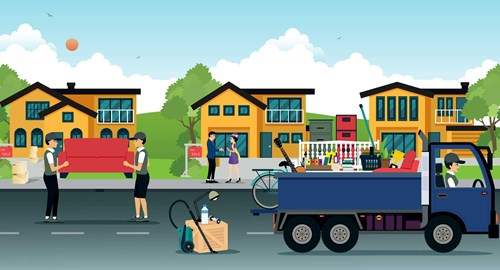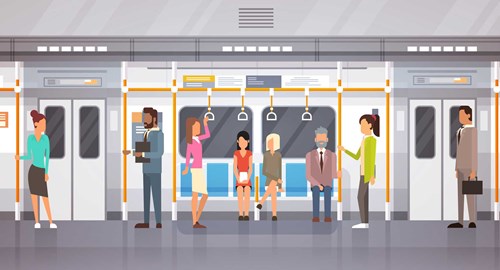Working in Singapore

There are many reasons why Singapore continues to be a top draw for foreigners. Working in Singapore as an expat provides a newfound career challenge for both fresh university graduates and career executives, while also offering a unique cultural and lifestyle experience. As an added bonus, its location in the Asia-Pacific region allows expatriates the chance to explore the rest of Asia's wonders via Singapore's Changi Airport, consistently hailed as the world's best airport. Why does Singapore continue to be the expats' favorite in global liveability surveys? Here's your chance to find out about working in Singapore and living a different kind of island life.
The Expat Life in Singapore
In HSBC’s 2018 annual expat survey, the country once again topped the charts, based on the replies from over 27,000 expats from 159 countries. Despite tough competition from other Asian countries such as Hong Kong and Japan, Singapore remains a favorite for expatriates.
Based on the survey, 60 percent of expat parents in Singapore find that their children's health and well-being are better here than in their home country. Of the 500 Singapore expats polled, 59 percent of those who moved to the Lion City say that their present incomes now allow them to save for their retirement, while 45 percent mention that their currents earnings enable them to buy a property.
According to the 2017-2018 Global Competitiveness Index from the World Economic Forum, Singapore ranks third overall out of 137 countries on the list, with Hong Kong in sixth and Japan in ninth place as the only other Asian countries. The country takes second in terms of superior transport infrastructure and for its efficient labor market, with its financial sector described as "well-developed, stable and trustworthy," making it third in that category. The Economist Intelligence Unit (EIU) likewise agrees that Singapore remains to be the world's most investor-friendly location for 2018 in its Business Environment Rankings.
Based on the Singapore Ministry of Manpower’s (MOM) figures, there were 1.21 million foreigners working in the country in December 2017. Combined with citizens and permanent residents (excluding foreign domestic workers), the Singapore working population now stands at 3.7 million out of a total population of 5.6 million.
It goes without saying that finding employment in Singapore is highly competitive. Due to its topnotch reputation especially in finance, commerce and information technology, many multinational companies and foreign talents are attracted by the prospect of job opportunities in Singapore, a better quality of life for families, better income, and a change of lifestyle and scenery.
Finding Work in Singapore
If you're thinking of doing a little job hunting in Singapore, be prepared to have some stiff competition. The MOM reports that in December 2017, over 786,000 foreigners were working in the services sector, while 333,000 and 243,000 more were employed in construction and manufacturing, respectively.
Finance draws the highest share of foreign talent in Singapore, many coming from the United States, Australia, the UK, and Europe to find a job. Many of the world's top financial institutions chose to maintain a robust presence in Asia, and select Singapore as its base of operations.
Information technology experts are also in high demand, as Singapore continues to rank high in technological innovation. The tourism and hospitality industry in Singapore also attracts its fair share due to the country's stellar reputation as a prime sightseeing destination and the award-winning Singapore Changi Airport serving as the country's doorstep to the world. Singapore also boasts one of the busiest shipping industries in the world.
The Ministry of Manpower's website offers an online Self-Assessment Tool (SAT) to help employers check whether their foreign applicant meets the criteria to obtain the proper work pass. Many Singapore expats who have used the tool mention that the SAT is indeed accurate.
Should the SAT results indicate that the candidate is not eligible, employers are advised not to forward the Employment Pass application to the MOM. However, if the SAT does say the candidate qualifies for a work pass, chances are, a majority of the applications may be approved. It goes without saying that since the SAT is only an online tool, it cannot take into account the poor records of an applicant or a company's dubious profile.
Securing a Work Pass
Before you pack your bags, make sure you have a job offer and an employment pass waiting for you. As mandated by the Singapore Ministry of Manpower, any foreigner who wishes to work in Singapore must have a valid Employment Pass. Local and foreign firms in Singapore are required to comply with this rule, and anyone bent on finding work has to meet specific conditions to get the proper work permit.
There are different types of passes for foreign workers, including professionals and the skilled and semi-skilled, all of which are subject to certain criteria, and may or may not require an employer or employment agency to file the application. According to the latest guidelines from the MOM, foreigners who wish to avail of the Employment Pass are also evaluated based on the social and economic impact they would have on Singapore and its citizens.
Which Pass Do You Need?
The most common pass for foreign professionals is the Employment Pass (EP) that caters mostly to highly skilled professionals, managers and executives, and requires candidates to earn a fixed minimum income of SGD 3,600 per month. The pass is valid for up to two years for first-time candidates and valid up to three years upon renewal. Those who employ EP holders can choose whether to provide medical insurance for them or not. In this case, it's ideal to have an international health insurance plan in place prior to your relocation. Employment Pass holders also have the privilege of bringing certain family members to join them in Singapore. If you're moving to Singapore with an Employment Pass, your spouse and any children under 21 years old can join you using a Dependents' Pass provided your income is at least SGD 6,000 per month.
Those with more experience, higher incomes and seniority may be eligible for the Personalised Employment Pass (PEP) which is valid for three years but non-renewable and has its own criteria for income and eligibility. These include having a last drawn fixed monthly salary from overseas of at least SGD 18,000. Employment Pass holders who have a fixed monthly income of at least SGD 12,000 may choose to apply for the PEP instead.
There are certain restrictions for eligibility when it comes to the PEP. EP holders under the sponsorship scheme are not eligible nor are freelancers or foreigners who work on a freelance basis. Those who do not qualify include journalists, editors, sub-editors and producers, and anyone who serves as a sole proprietor, partner or director who is also a shareholder in a company registered under the Accounting and Corporate Regulatory Authority (ACRA) of Singapore. ACRA serves to regulate the business entities, public accountants and corporate service providers in Singapore.
In Singapore, it only takes two and a half days to start a business, making it second place in the world for ease of doing business in 2018, according to a World Bank report. The country also ranks among the top 10 globally for protecting minority investors, ease of paying taxes and enforcing contracts. The business-friendly environment makes it very attractive for any foreign entrepreneurs, innovators or investors who wish to start and operate new businesses in Singapore.
Those who wish to do so can apply for the EntrePass, which is valid for one year at first and allows you to leave and re-enter Singapore easily. While it requires no minimum income, the EntrePass includes more stringent requirements, including for those who wish to avail of the Dependent's Pass for their families. Foremost of these is that the business must be a private limited company registered with ACRA and the required funding. If the company is already registered, it must not be more than six months from the date of application.
Those who wish to avail of an EntrePass must submit several documents including a business plan in English that includes the applicant's profile in terms of professional experience, track record in growing startups, any awards or recognitions given by credible organizations or prominent national body, academic qualifications, etc. The business plan should also include the business idea, the products or services offered, an accompanying market analysis and any supporting documents such as certifications, licensing agreements and endorsements. The last section should feature the implementation plan including financial projections and a profile of the management team.
Please note that there are certain businesses not eligible for an EntrePass. These include coffee shops, hawker centers, and food courts, and bars, nightclubs and karaoke lounges in the food and entertainment sectors. Others that are also considered inadmissible are foot reflexology and massage clinics, Traditional Chinese medicine and acupuncture, herbal dispensing businesses, geomancy, and employment agencies.
Passes for Skilled and Semi-Skilled Workers
Data on foreign workers provided by the Ministry of Manpower shows that at the end of 2017, there were 187,700 Employment Pass holders, 184,400 S-Pass holders, and 965,200 holding Work Permits, including foreign domestic workers and workers in the construction industry.
Mid-level skilled employees regardless of nationality may apply for the S-Pass, which requires a lower minimum income of at least SGD 2,200 a month, and less stringent criteria on skills and academic requirements. The S-Pass is valid for up to two years but if the pass holder switches jobs, he has to apply for a new pass. Employers of S-Pass holders are required to provide them medical insurance. Just like with Employment Pass holders, those who hold an S-Pass and wish to avail of a Dependent's Pass for their family members must earn at least SGD 6,000 for them to qualify.
However, note that this type of work pass is determined by quotas imposed by the Singaporean government that requires companies to hire a certain number of local staff before its foreign employees' work passes can be approved. The MOM also evaluates the hiring companies and its foreign candidates based on salaries offered, relevant work experience and academic qualification of the applicants. Currently, the Singapore government is encouraging the hiring of more locals and providing them with more training opportunities and roles within the companies, thus creating a healthier ratio that gives Singapore residents a better chance at long-term employment.
Meanwhile, foreign workers in the construction, manufacturing, processing, marine or services sectors require a Work Permit (WP). The issuance of Work Permits are conditional on quotas for the abovementioned industries, and employers are required to pay a monthly levy and provide medical insurance for each worker. Work Permits are valid up to two years, depending on the worker's passport validity, security bond and employment period. There is no minimum salary required for those who wish to avail of the WP, but they can't avail of the Dependent's Pass for their family.
All employees working in Singapore under a contract service are covered by Singapore's Employment Act which stipulates the basic terms and conditions for employees at work. This includes full-time, part-time, temporary and contract workers. Similarly, foreign employees who hold an Employment Pass, S-Pass or Work Permits are also covered by the Employment of Foreign Manpower Act that outlines the employer's responsibilities and obligations for employing foreign workers.
Passes for Foreign Trainees and Students
There are also work passes available for foreign professionals who need to undergo practical training at their company offices in Singapore, for students aged 18 up to 25 who want to combine work and holidays in Singapore, and foreign trainees who are considered semi-skilled.
The Training Employment Pass is aimed at foreign trainees or foreign students who wish to undergo training in Singapore for professional, managerial, executive or specialist positions. The Pass is valid up to three months, non-renewable and does not allow for family members to join the candidate in Singapore.
Foreign undergraduate or graduate students aged 18 to 25 who want experience a working holiday in Singapore can apply for the Work Holiday Pass under the Work Holiday Programme of the Singapore Ministry of Manpower. Undergraduates should be a resident and full-time student of the university for at least three months prior to applying for the pass. Those who have graduated should have been a resident and full-time university students. Eligible students must come from universities located in and recognized by the governments of Australia, Germany, Hong Kong, Japan, New Zealand, Switzerland, the United Kingdom or the United States. There are only 2,000 slots available for the Work Holiday Pass, which is valid for six months and is non-renewable.
On the other hand, students aged 18 to 30 with Australian citizenship may avail of the Work Holiday Pass under the Work and Holiday Visa Programme. Candidates must have a university degree or at least have completed the equivalent of two years of full-time undergraduate study at a university. While this particular Work Holiday Pass is valid for 12 months, the Work Holiday and Visa Programme only offers 500 places at any one time.
Getting a Dependent's Pass for Your Family
For most expatriates, relocating with their family only makes sense, especially for those with young children. After all, many expats who chose to stay in Singapore cite its clean and safe surroundings, efficient public transportation and educational systems.
Those holding an Employment Pass or S-Pass are eligible to bring certain family members when they move to Singapore by applying for a Dependent's Pass. The Dependent's Pass is for the foreign worker's legally married spouse or unmarried children under 21 years old, with the EP or S-Pass holder's employer or appointed employment agent applying on their behalf. The Dependent's Pass is valid for up to two years and tied to the duration of the employee's work pass.
Qualified Dependent's Pass holders are allowed to work in Singapore. For those whose spouses hold an Employment Pass, EntrePass or Personalised Employment Pass, they may get a Letter of Consent to Work in Singapore if they find a job there. For the dependents of S-Pass holders, they are required to apply for a Work Permit S-Pass or Employment Pass instead and should meet all the criteria required for these passes. Once they get an Employment Pass or S-Pass, they are required to cancel their Dependent's Pass. S-Pass dependents who avail themselves of a Work Permit should know that their Work Permit's duration is contingent to the validity of the original S-Pass holder's.
Expats possessing an eligible Employment Pass or S-Pass who wish to have their common-law spouse, step-child or handicapped child join them in Singapore may wish to apply for the Long Term Visit Pass (LTVP). They may also bring their parents on the same pass as long as their monthly income is over SGD 12,000.
Just like the Dependent's Pass, the original EP or S-Pass holder's employer or an appointed employment agent must apply for the LTVP on their behalf. The LTVP is subject to the duration of the main work pass, valid up to two years and can be renewed six months before expiry. For more information about Singapore's work passes and permits for foreigners, please visit http://www.mom.gov.sg/passes-and-permits.
Your Wages and Income Tax
Singapore's status as one of the most stable and progressive economies in the world also creates a high standard of living for its residents. Property prices and rents in Singapore are one of the highest in the world, and international schools command high fees. Needless to say, your income should be able to keep up with the cost of living in Singapore.
A quick way to find out the median monthly gross salary for your career level or job position, the Ministry of Manpower's Occupational Wage Search page offers a useful tool that reveals the gross monthly income for specific occupations and also offer salary comparisons for similar positions. The resulting amount includes overtime pay, commissions, and allowances.
Do you need to pay income tax if you're an expat working in Singapore? Yes, you do. Income taxes in Singapore are filed annually every April 15. Unlike in other countries, employers don't withhold the taxes from employees' salaries. The Inland Revenue Authority of Singapore (IRAS) provides a very helpful guide on tax information for foreigners which explains the criteria of tax residency and the appropriate tax rates.
According to the IRAS, a tax resident is a Singaporean citizen or permanent resident who lives in Singapore except for temporary absences; and any foreigner who has lived and worked in Singapore for 183 days or more in the previous year of assessment. Those who do not fall under these conditions are considered non-residents.
Tax residents are taxed on a progressive scale ranging from zero to 22 percent from the Year of Assessment and may avail of tax relief. Non-residents are taxed at a flat rate of 15 percent or the resident rates, whichever results in a higher tax amount based on one's employment income, and are not eligible for tax relief.
Aside from salaries and bonuses, other employment benefits such as housing and stock options also comprise one's taxable employment income. However, any income derived outside Singapore, Singapore dividends, and bank interests are considered tax-exempt. Get more information about taxes on the Inland Revenue Authority of Singapore (IRAS) website at http://www.iras.gov.sg/irashome.
A Social Safety Net: The Central Provident Fund
The Central Provident Fund (CPF) is Singapore's social security system and covers only Singapore citizens and permanent residents. The CPF was established to help working Singaporean citizens and permanent residents save for retirement and provides assistance for healthcare, home ownership, family protection, and asset enhancement.
Expats can start making monthly contributions to their CPF when they become Singapore Permanent Residents (SPR). For the first two years, CPF contributions by both employees and employers can be done at reduced rates to help employees adjust to the lower take-home pay. Eligible members can withdraw their CPF savings if they leave Singapore permanently and have no intention of returning for re-employment or residence, or are permanently incapacitated.
CPF monthly contributions go into several accounts designed for various purposes including housing, medical and retirement needs. These include the Ordinary Account (OA) designed for housing, insurance, investment and education, and the Special Account (SA) for old age and investments in retirement-related financial products. The MediSave Account (MA) is geared towards health insurance and hospitalization expenses while the Retirement Account (RA) is created automatically on one's 55th birthday. For more information about the CPF, visit http://www.cpf.gov.sg.






